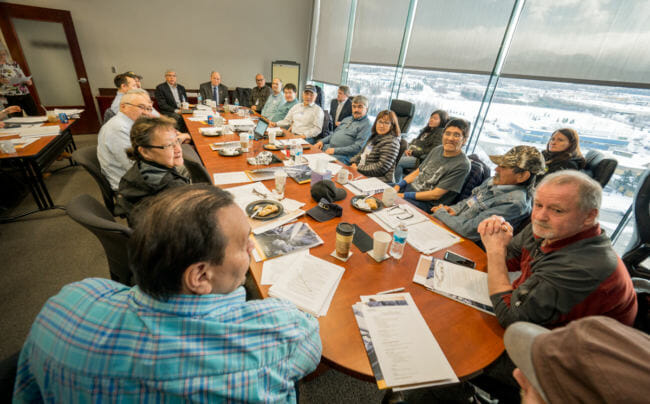
In a place like the Alaskan Arctic, local issues often unfold on a national, or even international scale. Oil companies, the state, the federal government, environmental groups — they all have something that they want to see happen there.
So, how do the wants of local people get heard? And who gets to speak for them?
There’s a new organization that says the Iñupiat of the North Slope will be stronger if they speak as one.
The group is called Voice of the Arctic Iñupiat, or VOICE. It’s a nonprofit, and gets its funding from the North Slope Borough and the Arctic Slope Regional Corporation, as well as donations from its other member entities, and public contributions through its website. Their goal is to bring together the leaders of the region to weigh in on policies that affect their communities.
John Hopson, Jr. is the mayor of the village of Wainwright and vice chairman of VOICE.
“Whether it’s development, whether it’s subsistence rights, we want to be heard in our fashion, in our manner,” Hopson said in a promotional video on their website. “Not someone who lives in Washington D.C. telling us what’s right and what’s wrong for us.”
Leaders like Hopson from the local governments, tribal councils and Native corporations say they kept hearing outsiders — like politicians in Washington, D.C., and environmental groups — talking on a national stage about their local issues. And some of those leaders felt that their groups would be better heard on that national stage if they unified.
Speaking at a Resource Development Council conference last November, VOICE Chairman Rex A. Rock Sr. described the idea for the group this way: “To allow us, as many different individual organizations with unique purposes and goals to come together, to finally speak with one voice.” Rock is also the President and CEO of the Arctic Slope Regional Corporation.
Since VOICE was launched in 2015, it’s invited 28 leadership organizations across the North Slope to be members. Twenty have accepted.
The city of Utqiaġvik is a member, and the mayor, Fannie Suvlu, represents the city at VOICE meetings. She says that hard conversations sometimes happen around the table. Some policies affect certain parts of the North Slope differently than others, and not everyone agrees. She likes that part of it — hearing what other leaders are thinking.
“I know what’s happening with [the Arctic National Wildlife Refuge], but I don’t know how it’s affecting the people at home in ANWR,” Suvlu said. “Or…I know that that we have development in Alpine real close to Nuiqsut, but I don’t see the everyday effects of that.”
But Mayor Suvlu also says that in this regard the organization hasn’t yet reached its full potential.
That’s because despite the emphasis on unity, there are some big gaps in the membership. For example, there’s currently no representation from the village of Nuiqsut, which is one of the places on the North Slope most directly impacted by development.
Also missing is the regional tribal government, the Iñupiat Community of the Arctic Slope, or ICAS. That’s the group that the federal government has to consult with before taking any action in the region.
George Edwardson is the President of ICAS.
“We don’t want to weaken our ability to speak and stand, and to join the VOICE we would have to,” Edwardson said.
To be clear, Edwardson doesn’t have a problem with the fact that these other leadership groups have teamed up as VOICE. He just thinks that remaining separate from the organization will give his group the independence it needs to counterbalance some of the others in the region, like the local corporations.
“They’re doing what they were designed to do: make money,” Edwardson said. “And as a regional tribal government, my job is to protect the ecosystem, and the people and the culture.”
One of Edwardson’s group’s big issues is offshore drilling. He says they’re completely opposed. But VOICE has decided not to take a position on offshore development, though they have said they want several critical subsistence areas to be off-limits.
And this gets at the real question facing leaders on the North Slope. Do they join together, hash out their differences, and try speak to issues with one voice, like Mayor Suvlu and the members of Voice of the Arctic Iñupiat are suggesting?
“I definitely think it’s possible to have a unified voice but it’s never going to be truly unified unless all entities that were invited to the table take advantage of it,” Mayor Suvlu said.
Or, are their constituents better served by a chorus of distinct ones, like George Edwardson and his group?
“So when the community has issues, we’ll stand up with them,” Edwardson said. “Sometimes the issues might be against one of the organizations in Voice of the Arctic… Sometimes we internally fight each other; that’s no problem…that’s how democracy works. Everybody has its voice.”
Voice of the Arctic Iñupiat says it respects the regional tribal government’s decision not to become a member, and that the door is always open for the groups that have been invited to join.
Editor’s Note: The original version of this story listed the North Slope Borough and Arctic Slope Regional Corporation as the funding sources for VOICE. It has been corrected to reflect additional sources of funding.




